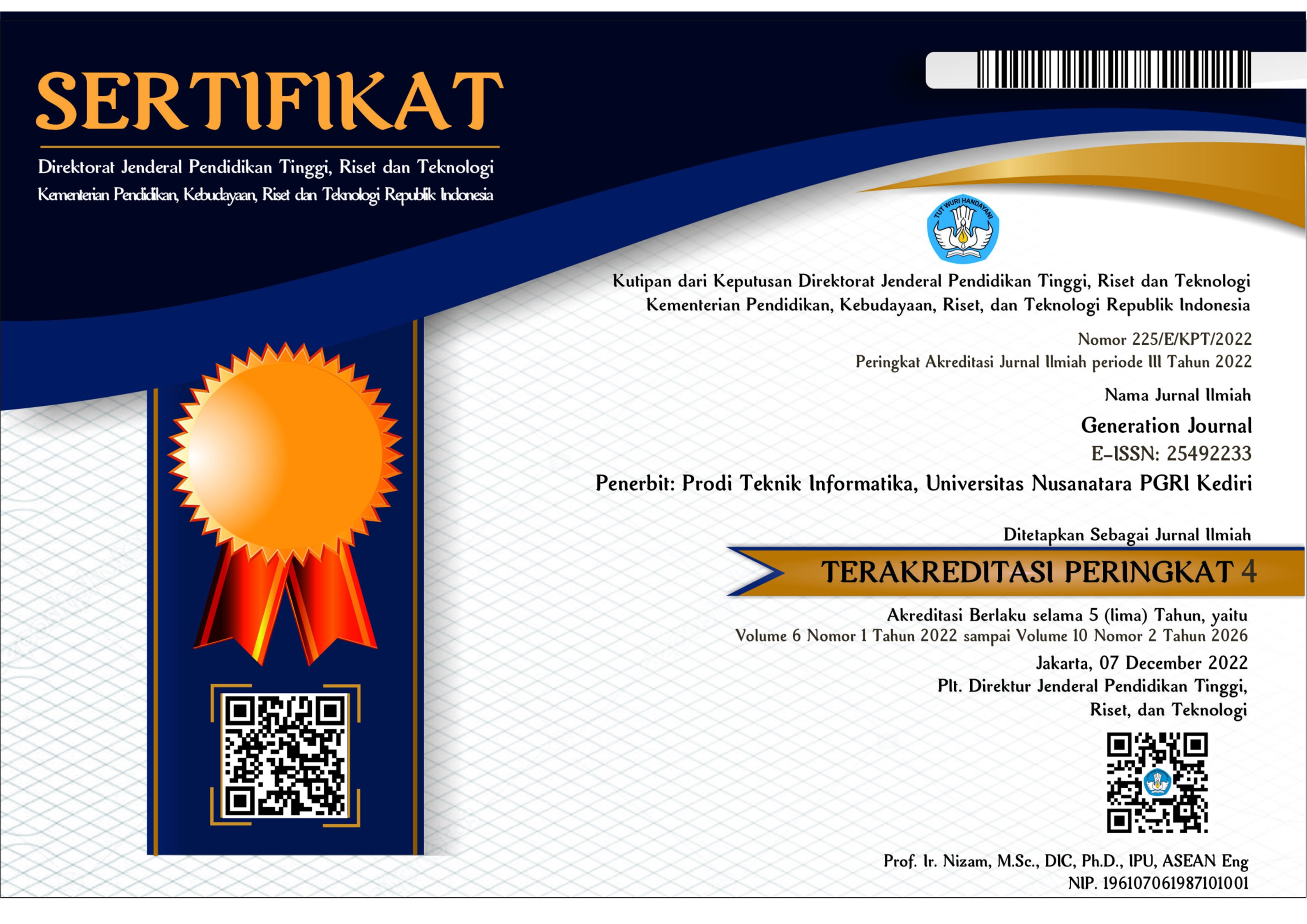Implementasi Convolution-Augmented Transfomer Berbasis Kecerdasan Buatan dalam Analisis Sentimen Teks Hasil Konversi Suara ke Teks
DOI:
https://doi.org/10.29407/gj.v8i1.22202Keywords:
Speech to Text, Sentiment Analysis, Conformer, Penyandang disabilitas pendengaran, Kecerdasan BuatanAbstract
Keterbatasan mendapatkan informasi yang dialami penyandang disabilitas menjadikan mereka kurang update terhadap perkembangan yang terjadi sehingga secara tidak langsung mendorong berbagai upaya untuk mendapatkan informasi tanpa mempedulikan sumber dan konteks informasi yang diperoleh, konteks informasi yang diperoleh dalam hal ini berkaitan dengan emosi yang berusaha disampaikan lewat tulisan atau teks informasi, maka perlu dirancang dan diimplementasikan yang mampu mengekstraksi dan menemukan inteprestasi emosi bermuatan positif, negatif atau netral dari teks hasil konversi teknologi Speech to Text, sehingga dapat membantu penderita disabilitas pendengaran dalam memahami konteks dan emosi yang terkandung didalam informasi. Aplikasi Speech to Text yang dikombinasikan dengan metode Conformer berbasis kecerdasan buatan dapat membantu penyandang disabilitas pendengaran untuk memahami sentimen atau emosi dari teks hasil konversi suara. Dengan menggunakan kecerdasan buatan yang tergabung dalam metode Conformer dapat dilakukan klasifikasi sentimen terhadap teks hasil konversi juga dapat dideteksi topik yang disampaikan, sehingga diharapkan dapat dimanfaatkan penyandang disabilitas pendengaran dalam memberikan umpan balik yang tidak menyinggung perasaan dan sesuai topik bahasan.
References
R. Husnaini, “HADIS MENGENDALIKAN AMARAH DALAM PERSPEKTIF PSIKOLOGI.”
RVS College of Engineering & Technology and Institute of Electrical and Electronics Engineers, Proceedings of the International Conference on Inventive Research in Computing Applications (ICIRCA 2018) : date: July 11-12, 2018.
H. Utama and A. Masruro, “Analisis Sentimen pada Twitter menggunakan Word Embedding dengan Pendekatan Word2Vec,” 2022.
E. Febriyani and H. Februariyanti, “Analisis Sentimen Terhadap Program Kampus Merdeka Menggunakan Algoritma Naive Bayes Classifier Di Twitter,” vol. 17, no. 1.
F. Eka Purwiantono and A. Aditya, “KLASIFIKASI SENTIMEN SARA, HOAKS DAN RADIKAL PADA POSTINGAN MEDIA SOSIAL MENGGUNAKAN ALGORITMA NAIVE BAYES MULTINOMIAL TEXT,” Jurnal TEKNOKOMPAK, vol. 14, no. 2, pp. 68–73, 2020.
O. B. Deho, W. A. Agangiba, F. L. Aryeh, and J. A. Ansah, “Sentiment Analysis with Word Embedding.”
A. Rizal Maulana, S. Hadi Wijoyo, and Y. T. Mursityo, “ANALISIS SENTIMEN KEBIJAKAN PENERAPAN KURIKULUM MERDEKA SEKOLAH DASAR DAN SEKOLAH MENENGAH PADA MEDIA SOSIAL TWITTER DENGAN MENGGUNAKAN METODE WORD EMBEDDING DAN LONG SHORT-TERM MEMORY NETWORKS (LSTM),” vol. 10, no. 3, pp. 523–530, 2023, doi: 10.25126/jtiik.2023106977.
A. Gulati et al., “Conformer: Convolution-augmented Transformer for Speech Recognition,” May 2020, [Online]. Available: http://arxiv.org/abs/2005.08100
ICASSP 2020 - 2020 IEEE International Conference on Acoustics, Speech and Signal Processing (ICASSP). IEEE, 2020.
G. F. Avisyah, I. J. Putra, and S. S. Hidayat, “Open Artificial Intelligence Analysis using ChatGPT Integrated with Telegram Bot,” Jurnal ELTIKOM, vol. 7, no. 1, pp. 60–66, Jun. 2023, doi: 10.31961/eltikom.v7i1.724.
T. S. Sabrila, V. R. Sari, and A. E. Minarno, “Analisis Sentimen Pada Tweet Tentang Penanganan Covid-19 Menggunakan Word Embedding Pada Algoritma Support Vector Machine Dan K-Nearest Neighbor,” Fountain of Informatics Journal, vol. 6, no. 2, p. 69, Jul. 2021, doi: 10.21111/fij.v6i2.5536.
X. Chen, Y. Xue, H. Zhao, X. Lu, X. Hu, and Z. Ma, “A novel feature extraction methodology for sentiment analysis of product reviews,” Neural Comput Appl, vol. 31, no. 10, pp. 6625–6642, Oct. 2019, doi: 10.1007/s00521-018-3477-2.
IEEE Staff, 2017 International Conference on Intelligent Communication and Computational Techniques (ICCT). IEEE, 2017.
Universitas Atma Jaya Yogyakarta, Institute of Electrical and Electronics Engineers. Indonesia Section. Computer Society Chapter., Institute of Electrical and Electronics Engineers. Indonesia Section., and Institute of Electrical and Electronics Engineers, 2019 International Conference of Artificial Intelligence and Information Technology (ICAIIT 2019) : 13-15 March 2019, Platinum Adisucipto Yogyakarta Hotel & Conference Center.
M. Z. Rahman, Y. A. Sari, and N. Yudistira, “Analisis Sentimen Tweet COVID-19 menggunakan Word Embedding dan Metode Long Short-Term Memory (LSTM),” 2021. [Online]. Available: http://j-ptiik.ub.ac.id
R. Arulmurugan, K. R. Sabarmathi, and H. Anandakumar, “Classification of sentence level sentiment analysis using cloud machine learning techniques,” Cluster Computing, vol. 22. Springer Science and Business Media, LLC, pp. 1199–1209, Jan. 16, 2019. doi: 10.1007/s10586-017-1200-1.
P. Nandwani and R. Verma, “A review on sentiment analysis and emotion detection from text,” Social Network Analysis and Mining, vol. 11, no. 1. Springer, Dec. 01, 2021. doi: 10.1007/s13278-021-00776-6.
Downloads
Published
Issue
Section
License
Authors who publish with this journal agree to the following terms:
- Copyright on any article is retained by the author(s).
- The author grants the journal, the right of first publication with the work simultaneously licensed under a Creative Commons Attribution License that allows others to share the work with an acknowledgment of the work’s authorship and initial publication in this journal.
- Authors are able to enter into separate, additional contractual arrangements for the non-exclusive distribution of the journal’s published version of the work (e.g., post it to an institutional repository or publish it in a book), with an acknowledgment of its initial publication in this journal.
- Authors are permitted and encouraged to post their work online (e.g., in institutional repositories or on their website) prior to and during the submission process, as it can lead to productive exchanges, as well as earlier and greater citation of published work.
- The article and any associated published material is distributed under the Creative Commons Attribution-ShareAlike 4.0 International License













